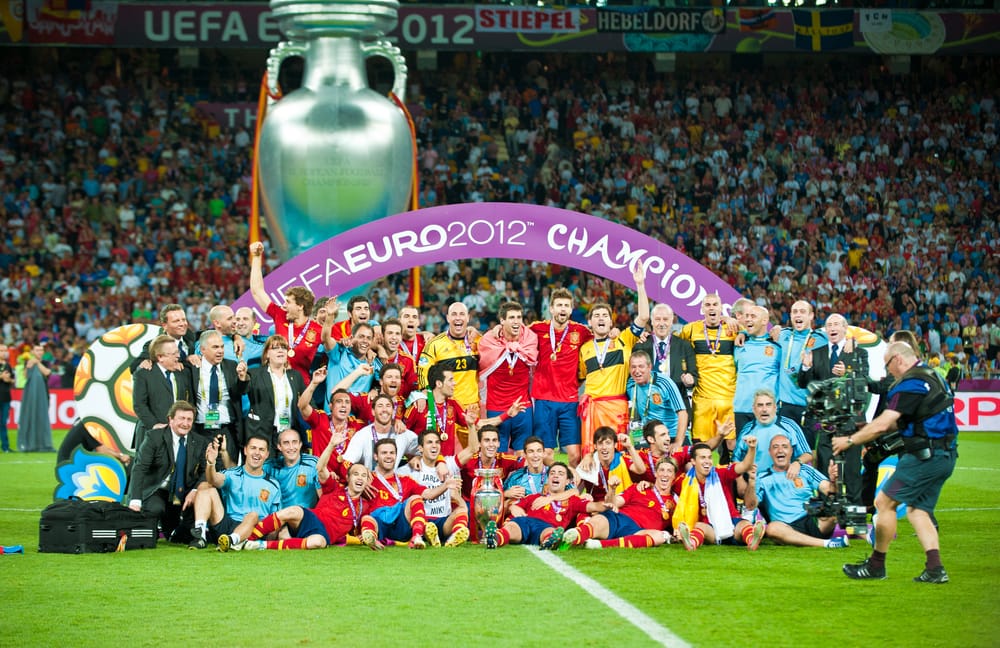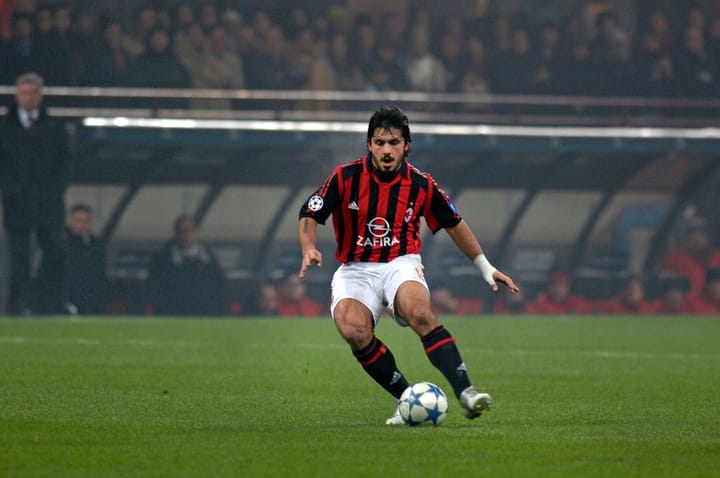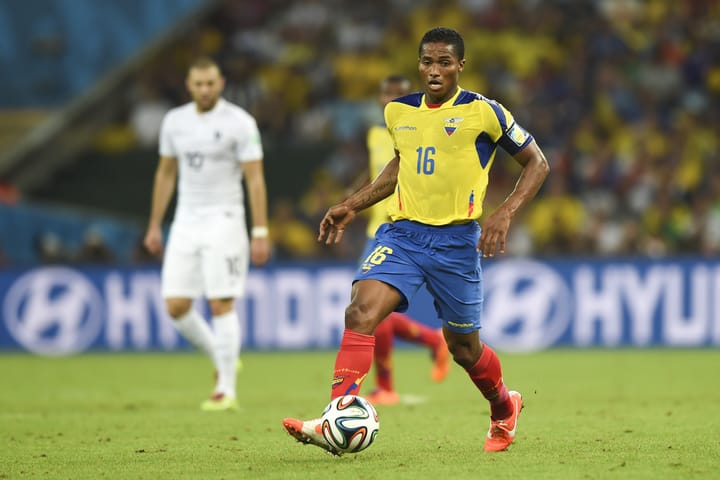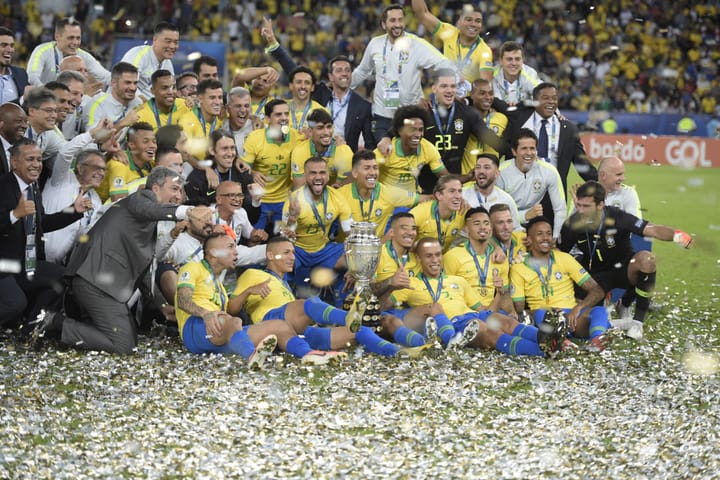Tracing the Triumphs: The Last Five Winners of the Euros
In this article we look back at the last 5 winners of the European Soccer Championships, the Euros.

The UEFA European Championship, commonly known as the Euros, is the premier international soccer competition in Europe, organized by the Union of European Football Associations (UEFA). This prestigious tournament, held every four years, has captivated soccer enthusiasts across the continent and beyond, with its rich history, intense rivalries, and unforgettable moments.
In this article, we will delve into the stories of the last five teams to have lifted the coveted Henri Delaunay Trophy, exploring their journeys, key players, and the impact of their victories on the European soccer landscape.
Euro 2004: Greece's Unlikely Triumph
The 2004 UEFA European Championship was a tournament that defied all expectations, as the underdog Greek national team emerged victorious, shocking the soccer world with their unlikely triumph.
Greece's Improbable Journey
Prior to the 2004 Euros, Greece had a relatively modest record in major international tournaments, having qualified for only one previous European Championship (in 1980) and one World Cup (in 1994). However, under the guidance of German coach Otto Rehhagel, the Greek team underwent a remarkable transformation, becoming a well-organized and resilient unit.
In the group stage, Greece managed to secure a surprise victory over the host nation, Portugal, setting the tone for their unexpected run. They then navigated their way through the knockout rounds, defeating France and the Czech Republic to reach the final, where they would face off against Portugal once again.
The Final: A Defensive Masterclass
The final, held at the Estádio da Luz in Lisbon, was a tense and cagey affair, with both teams struggling to create clear-cut scoring opportunities. However, it was the Greek team that ultimately prevailed, thanks to a well-executed game plan and a resolute defensive performance.
In the 57th minute, Angelos Charisteas scored the decisive goal, capitalizing on a defensive lapse by the Portuguese defense. From that moment on, the Greek players dug deep, defending with discipline and organization, frustrating their more illustrious opponents.
As the final whistle blew, the Greek players and fans erupted in celebration, as they had achieved the unthinkable – winning the European Championship against all odds.
Euro 2008: Spain's Resurgence
The 2008 edition of the UEFA European Championship marked a significant turning point in the history of Spanish soccer, as the national team, often criticized for their underperformance on the international stage, finally broke through and claimed their first Euros title in 44 years.
Spain's Road to Redemption
Spain's journey to the 2008 Euros triumph was a testament to their resilience and determination. After a disappointing performance at the 2006 World Cup, the Spanish national team underwent a period of introspection and restructuring, with the appointment of Luis Aragonés as the new head coach.
Under Aragonés' guidance, the Spanish players embraced a new tactical approach, emphasizing possession-based soccer and a high-pressing game. This shift in philosophy paid dividends as the team navigated their way through a challenging group stage, securing victories over Russia, Sweden, and Greece.
In the knockout rounds, Spain continued to impress, defeating Italy and Russia to set up a final showdown against Germany, the reigning world champions at the time.
The Final: A Triumph of Tactical Brilliance
The final, held at the Ernst Happel Stadion in Vienna, Austria, was a closely contested affair, with both teams showcasing their technical prowess and tactical acumen. However, it was Spain who emerged victorious, thanks to a well-executed game plan and the individual brilliance of their players.
The decisive moment came in the 33rd minute, when Fernando Torres capitalized on a defensive lapse to score the winning goal. The Spanish players then proceeded to control the tempo of the game, maintaining possession and frustrating their German counterparts.
The final whistle blew, and Spain had finally ended their long wait for a major international trophy. The celebrations that erupted among the Spanish fans were a testament to the team's hard-earned success, as they had finally shed their reputation as perennial underachievers.
Euro 2012: Spain's Historic Dominance
The 2012 edition of the UEFA European Championship saw the continued dominance of Spain, as the La Roja secured their third Euros title in four tournaments. This remarkable achievement cemented Spain's status as one of the greatest international teams of the modern era, solidifying their legacy as a true powerhouse in European soccer.
Spain's Path to Glory
Spain's journey to the 2012 Euros title was marked by their characteristic possession-based style of play and the exceptional talent of their squad. Led by the legendary Vicente del Bosque, the Spanish national team navigated their way through a challenging group stage, showcasing their technical prowess and tactical discipline.
In the knockout rounds, Spain continued to impress, dispatching France and Portugal with relative ease. Their semifinal clash against Portugal was a tightly contested affair, but the Spaniards prevailed, setting up a final showdown against Italy, who had also impressed throughout the tournament.
The Final: A Masterclass in Possession and Precision
The final, held at the Olympic Stadium in Kyiv, Ukraine, was a one-sided affair, with Spain completely dominating their Italian counterparts. From the opening whistle, the Spanish players dictated the tempo of the game, controlling possession and creating numerous scoring opportunities.
The breakthrough came in the 14th minute, when David Silva opened the scoring with a well-placed header. This set the tone for the rest of the match, as Spain continued to assert their dominance, with further goals from Jordi Alba, Fernando Torres, and Juan Mata sealing a comprehensive 4-0 victory.
The Spanish players' technical ability, tactical awareness, and teamwork were on full display, as they completely outclassed their opponents, leaving no doubt as to their superiority. This victory not only cemented Spain's status as the dominant force in European soccer but also solidified their place in the pantheon of international soccer greatness.
Euro 2016: Portugal's Historic Triumph
In the 2016 edition of the Euros, held in France, the spotlight shone brightly on Portugal, a team that had long been overshadowed by the success of their Iberian neighbors, Spain. Led by the iconic Cristiano Ronaldo, the Portuguese squad defied the odds and navigated their way through a challenging tournament, overcoming host nation France in the final. Despite losing their talisman to injury early in the match, the Portuguese players rallied together, and in the 109th minute, Eder's stunning strike sealed the nation's first-ever European Championship title. This triumph not only cemented Portugal's status as a force to be reckoned with but also solidified Ronaldo's legacy as one of the greatest players to ever grace the international stage.
The Road to Glory
Portugal's journey to the 2016 Euros title was anything but straightforward. They were drawn in a tough group alongside Iceland, Austria, and Hungary, and struggled to find their rhythm in the early stages of the tournament. However, their resilience and determination shone through as they secured a spot in the knockout rounds, setting up a quarterfinal clash with Poland. In a tense affair that went to penalties, the Portuguese prevailed, with goalkeeper Rui Patrício emerging as the hero.
In the semifinals, they faced off against Wales, a surprise package in the tournament, led by the talismanic Gareth Bale. However, the Portuguese defense stood firm, and a goal from Ronaldo and a brace from Nani secured a 2-0 victory, booking their place in the final against the host nation, France.
The Final: A Triumph Against the Odds
The final at the Stade de France in Paris was a tense and closely contested affair. Portugal suffered a significant blow early on when Ronaldo, their captain and talisman, was forced off the field due to injury. However, the team's resolve and tactical discipline shone through, as they weathered the French onslaught and maintained their composure.
In the 109th minute of extra time, Eder, a substitute who had struggled to make an impact throughout the tournament, stepped up and delivered the decisive moment. With a powerful strike from outside the box, he beat the French goalkeeper and sent the Portuguese supporters into a frenzy. The final whistle blew, and Portugal had achieved the unthinkable, becoming the first team to win the Euros without winning a single group stage match.
Euro 2020: Italy's Resurgence and Redemption
The 2020 edition of the UEFA European Championship, held in 2021 due to the COVID-19 pandemic, saw the resurgence of Italy as a dominant force in international soccer. After their failure to qualify for the 2018 FIFA World Cup, the Azzurri, led by Roberto Mancini, embarked on a remarkable journey to redemption, culminating in a thrilling victory over England in the final at Wembley Stadium.
The Azzurri's Road to Glory
Italy's path to the 2020 Euros title was marked by a remarkable turnaround in their fortunes. Under the guidance of Roberto Mancini, the team had undergone a transformative process, rebuilding their squad and instilling a new sense of unity and determination. Their group stage performances were nothing short of impressive, as they breezed through the competition, winning all three of their matches and conceding only three goals.
In the knockout rounds, Italy continued to impress, dispatching Austria, Belgium, and Spain with relative ease. Their semifinal clash against Spain was a closely contested affair that went to penalties, but the Italians held their nerve, emerging victorious and booking their place in the final against England.
The Final: Triumph at Wembley
The final at Wembley Stadium in London was a tense and thrilling affair, with the host nation England taking an early lead through a goal from Luke Shaw. However, the Italians, buoyed by their unwavering spirit and resilience, fought back and equalized through Leonardo Bonucci in the second half, sending the match into extra time.
In the penalty shootout that followed, the Italians showcased their composure and experience, with goalkeeper Gianluigi Donnarumma emerging as the hero, saving two penalties to secure the Azzurri's second European Championship title. The celebrations that erupted among the Italian fans, both in the stadium and across the country, were a testament to the team's remarkable journey and the nation's deep-rooted passion for the beautiful game.




